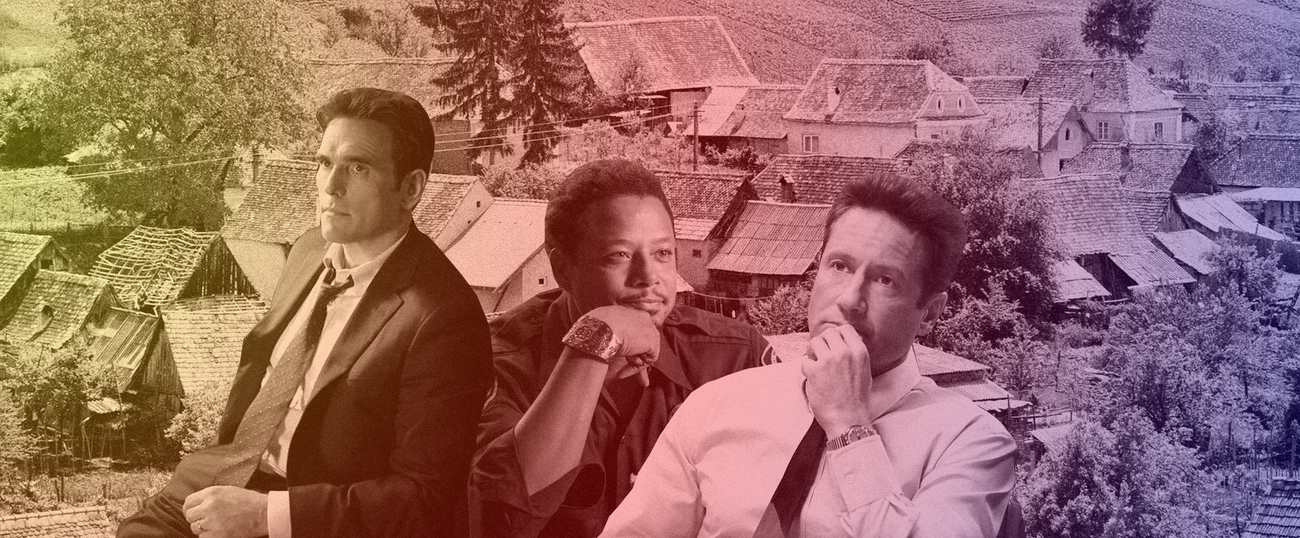TV’s Panicky New Shtetls
From a strange small town in Idaho to a menacing desert island, summer programming is all about anxious, insular communities




Ever since Matthew Weiner and his Mad Men said shalom to the small screen, TV, it seems, has become a starkly goyish affair: From I Can Do That, where celebrities compete against one another with newly acquired talents like juggling or doing a jig, to American Ninja Warrior’s extreme feats of acrobatics, the summer’s top shows are all about mindless, physical fun, three words seldom associated with Jews. But watch closely, and you’ll see something curious at work: Of the handful of new shows that debuted in recent weeks, a surprising number are really about life in a shtetl.
Take, for example, Fox’s Wayward Pines. Without spoiling too much of the fun—the show is an M. Night Shyamalan production, which means plot twists aplenty—it tells the story of a Secret Service agent who awakens after a bad car crash to find himself just outside a small Idaho town. He walks in, collapses in a coffee shop, and, when he comes to again, remembers that his reason for being there was to look for fellow agents who had gone missing in the area.
It’s a great setup for a mystery, but what gives the show its soul—other than terrific performances by Matt Dillon, Terrence Howard, and Juliette Lewis, all of whom are clearly having a blast with their hyperventilated roles—is the fact that everyone in the town is coltishly committed to protecting its quaint way of life against the corruptions of the world outside. Like the Skverer Hasidim in Shulem Deen’s excellent new memoir about losing his faith and leaving his pious community, the folks out in Wayward Pines, Idaho, cower in the shadow of a charismatic rebbe—in this case, Howard’s unimprovably named Sheriff Pope—and see any attempt at leaving as a transgression against some higher power. Shyamalan has toyed with this theme before in The Village, his underrated 2004 thriller that provided surprisingly nuanced insights into the life of a tiny, insulated group of pious people living on society’s periphery. Judging by the first few episodes of his latest effort, Shyamalan’s new shtetl is just as morally complex, as soothing as it is censorious.
Things are a bit less snug in the Hasidic court of another new TV rebbe, Charles Manson, the star of NBC’s Aquarius. For all of his slithering menace, Manson, as portrayed by Gethin Anthony from Game of Thrones, is a figure the Ba’al Shem Tov would’ve easily recognized, an ecstatic leader who offers his bored and, frequently, female adherents a direct path to God that bypasses the squares and their boring rules and courts transcendence through dance, song, and sex. He is also, of course, a monster, which Los Angeles police sergeant Sam Hodiak understands instinctively; but as Hodiak, played by David Duchovny, inches closer to his target, he catches a glimpse not only of Manson’s psychosis but also of his followers’ belief. The Manson Family is as homicidally dysfunctional as they come, but viewed against the grim backdrop of society crumbling around it, it’s not without its comforts and its cheer.
The same can’t be said of life on The Island, a new reality show hosted by British adventurer and TV personality Bear Grylls. Fourteen rough Americans, with names like Dr. Buck Parker and Dakota Mortensen, are transported to a deserted island and given only the most elementary tools. Tasked with finding everything from food to shelter, they must not only survive but also forge a society, one inevitably built to safeguard against the threats looming everywhere around their small, insular, and besieged strip of land.
They might as well be in Israel. For all of their exotic locales and sophisticated premises, what these newcomer shows really offer is a bundle of feelings deeply familiar to Jews: isolation; persecution; enemies, real or imagined; small communities that suffocate and nurture in equal measure; faith, tested and affirmed and shattered; and perseverance against all odds.
Not that these anxieties are unique to Jews. They belong just as organically to the current American zeitgeist, which is rooted in soil molded by fear of violence at home and abroad and by a feeling that the poet was right and that the center cannot hold. But as Rich Cohen so insightfully noted in these pages this week, Jews, even those of us not normally prone to paranoid tinglings, have reasons to fear that the world is closing in on us, from Iran’s ever-elongating shadow to the assault on Jewish life on American campuses.
To feed this anxiety, to fight it, or both, we could fix our eyes to cable news for more signs of impending doom. Or we can succumb to the much more entertaining sense of dread served up by the distressed small shtetls of summer network TV.
***
Like this article? Sign up for our Daily Digest to get Tablet Magazine’s new content in your inbox each morning.
Liel Leibovitz is editor-at-large for Tablet Magazine and a host of its weekly culture podcast Unorthodox and daily Talmud podcast Take One. He is the editor of Zionism: The Tablet Guide.